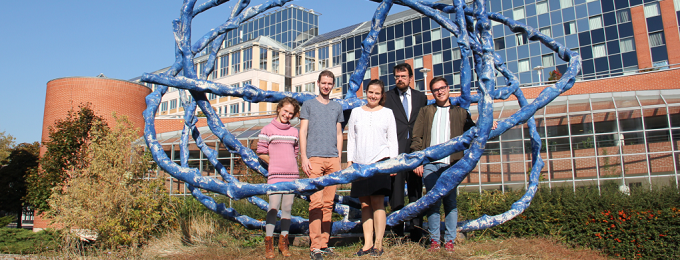The unique Swiss funding scheme PROMYS gives Edit Mátyus and other Eastern European scientists the possibility to build research groups in their home countries.
More than a decade after the big EU enlargement to Central and Eastern Europe, EU13 countries are more deeply integrated in the European research and education network than ever before. However, ‘brain drain’ still represents a challenge to the newest member states. Several steps have already been taken to counter the loss of skilled and highly educated workforce. In Horizon Europe for instance, the upcoming EU framework programme for research, 3.3% of the provisional budget will be allocated to widening measures. This represents a quasi-fourfold increase, compared to the ongoing research framework programme Horizon 2020 that ends in 2020. Widening measures aim to enhance participation rates of less performing countries in framework programmes, for instance by connecting their researchers to advanced projects elsewhere. This in turn should offer better opportunities for young and talented researchers within their home countries.
In the meantime, the Swiss National Science Foundation (SNSF) has established a specific fund to strengthen independent and excellent research in Eastern Europe. Under the name of ‘Promotion of Young Scientists in Eastern Europe’ (PROMYS), the initiative is aimed at promising young Eastern European researchers who intend to carry out research and continue their careers in one of the EU’s new member states. The condition is that they have studied or worked in Switzerland for at least two years. Through this investment in scientific collaboration with next-generation talents, EU13 states gain visibility in the European Research Area and enhance the continent’s competitiveness as a whole, as SNSF says. The project duration is five years.
After the first call in 2016, seven PROMYS grants were awarded to researchers from Romania, Croatia, Hungary and the Czech Republic. Taken together, they are worth 4.3 million Swiss francs, which equals 3.9 million euros.
One of the lucky grantees is Edit Mátyus. After having obtained a PhD in theoretical chemistry from Eötvös Loránd University (ELTE) in Budapest, she spent two years as an ETH Fellow at the Laboratory of Physical Chemistry at ETH Zurich. But, why Zurich? “For theoretical spectroscopists, ETH Zürich is a fascinating place to do basic research”, so Mátyus. Molecular spectroscopists study the interaction of light and molecular matter. “ETH has been the world-leading institution in this field.” In Switzerland, she very much enjoyed the supportive and motivating environment as well as the scientific strength of the laboratory. Other research stays brought her to the Georg-August University in Göttingen, the University of Stuttgart, the University of Georgia in Athens as well as to Princeton University.
Early in her career, Edit Mátyus realised that answering fundamental questions on molecular matter would require many years of work with an entire team. “The better the magnifying glass we look through, the less we know about what we see. I wanted to understand what is hiding under the highest resolution.”
PROMYS represented the first step towards her goal of independence. “I was in Cambridge for a two-year research stay when I heard about the SNSF call – and I immediately knew I had to apply”, she thinks back. After a successful two-phase evaluation process, Mátyus returned to her home institution with the PROMYS grant in summer of 2016. “ELTE has a traditionally strong curriculum in mathematics and theoretically oriented disciplines”, she says. There, she set up a research group and started working on theoretical molecular quantum dynamics. “Our aim is to go beyond the current theoretical foundations of chemistry and to achieve an unprecedented accuracy for molecular properties. We examine small molecules with an extraordinary detail and resolution, and look for previously neglected or even unknown chemical physical effects.”
The PROMYS project is running for another two years. Another unique PROMYS feature is the support of regular exchanges with research groups from Switzerland. “While we are working on our own projects here in Budapest, the collaboration with ETH as a large European science hub remains very important to us”, so the former ETH fellow.
Edit Mátyus’s research career reached another peak in September 2019, when she was awarded one of the prestigious Starting Grants from the European Research Council (ERC). “This was an important international recognition of the Hungarian scientific community and a big encouragement to pursue our ideas”, so Mátyus. Her contribution was the only funded research project from a Hungarian institution.
“My experience from PROMYS was very helpful for the preparation of the ERC Starting Grant application – both scientifically and procedurally.” The core idea for the ERC proposal had arisen from a subproject of the Swiss grant. “With PROMYS, I was able to take the first steps towards ultra-precise computations for small molecules. When I saw that our idea was feasible and promising, I decided to have a go at it.” A few years of experience with a smaller grant like PROMYS had turned out to be very useful during the ERC application and project preparation. “PROMYS enabled me to manage a grant involving not just myself but a smaller team. I learned to meet practical and administrative challenges of the daily work in the lab”, says Mátyus while looking back.
According to her experience, Budapest is more and more connected to the European mobility network. PhD students and post-docs from Hungary, Canada, Spain and Great Britain joined her research group. “In science as well as in education, there is a natural circulation of people. But as it is often said: Information spreads fast, but it takes time and effort to share knowledge and experience with others.”
The 36 years old welcomes initiatives to establish and maintain good framework conditions for research activities. PROMYS as an individual entry fellowship appears to be an effective instrument, so Mátyus: “It helped me to successfully participate in the ERC call while working in an area in Europe that has, until now, less experience with competitive funding schemes.“

